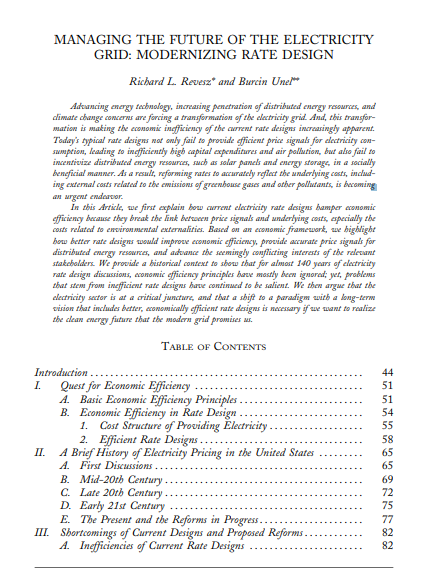-
Comments on OMB Reports to Congress
The Office of Management and Budget (OMB) issues yearly reports on the benefits and costs of federal regulations. We submitted comments on its draft 2018, 2019, and 2020 reports, explaining how OMB can better provide policymakers and the public with essential information.
-
Comments on Connecticut’s Study of the Value of Distributed Energy Resources
Connecticut’s Department of Energy and Environmental Protection (DEEP) and Public Utilities Regulatory Authority (PURA) are conducting a study to determine how it can best compensate distributed energy resources, like solar panels and residential battery installations, which can provide provide significant value to the grid. DEEP and PURA’s study involves an electric system dispatch simulation model and various DER technology use cases. We submitted comments on the model’s outputs and how they can be improved to better serve the study.
-
Comments to DOE on Energy Conservation Standards for Refrigerators and Freezers
The Department of Energy requested input on its analysis of energy conservation standards for consumer refrigerators, refrigerator-freezers, and freezers. We submitted comments encouraging DOE to, as it has in the past, monetize the full climate benefits of greenhouse gas emission reductions.
-
Comments to BLM on Oil and Gas Lease Sale in New Mexico
The Pecos District Office of the Bureau of Land Management (BLM) released an environmental assessment of a 2020 oil and gas lease sale in New Mexico. Despite calculating that foreseeable leasing activities would produce over 28 millions tons of downstream CO2-equivalent over a 20-year time horizon, BLM fails to monetize the real-world impacts of those emissions. We submitted comments encouraging BLM to estimate climate impacts using social cost of carbon metrics.
-
Comments to BLM on Alaska’s National Petroleum Reserve
The Bureau of Land Management’s (BLM) activity plan for the Alaska National Petroleum Reserve could lead to as much as 76.86 million tons of greenhouse gas emissions in a given year during peak production. We submitted joint comments urging BLM to monetize and contextualize the climate impacts of its plan using social cost of carbon metrics.
-
Comments to SEC on Shareholder Proposal Regulations
The Securities and Exchange Commission (SEC) proposed a rule that would limit investors’ ability to propose shareholder resolutions for a vote by fellow shareholders. The rule would raise requirements on the amount of stock required to be owned, impose requirements for the length of time the stock must have been held, and make it harder to resubmit resolutions that had failed to reach majority support in prior years. We submitted comments critiquing the rule, which will limit shareholder monitoring and likely have an outsized impact on shareholders’ role in environmental oversight.
-
Comments on Medicaid Fiscal Accountability Regulation
The Centers for Medicare and Medicaid Services at the Department of Health and Human Services proposed a rule that would likely reduce Medicaid funding, provider payments, and beneficiaries’ access to care. We submitted comments explaining serious flaws in the agency’s analysis, which fails to quantify funding reductions and assess the health impacts of reduced care.
-
Our Work on State Zero-Emission Credits Programs
Several states have determined that ensuring the viability of zero-emission electricity generation from nuclear power is critical to mitigating the impacts of climate change especially in the short term while states work to meet aggressive new clean energy goals. Through comments and amicus briefs, we’ve been involved in those efforts in both New York and New Jersey.
-
Managing the Future of the Electricity Grid: Modernizing Rate Design
This article, published in the Harvard Environmental Law Review, argues that the electricity sector is at a critical juncture, and that a shift to a paradigm with a long-term vision that includes better, economically efficient rate designs is necessary if we want to realize the clean energy future that the modern grid promises us.
-
Amicus Brief on Dust-Lead Hazard Standards
The Environmental Protection Agency (EPA) finalized a rule revising standards for lead found in dust on floors, window sills, and in soil. Our amicus brief critiques the rule, which forgoes net beneficial options in favor of weaker standards that will cause significant harms to public health.








